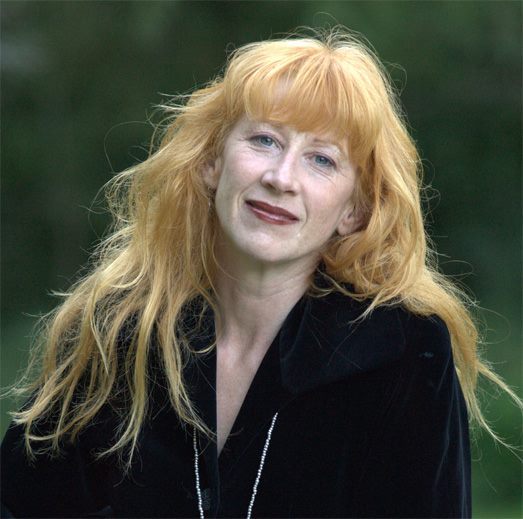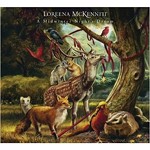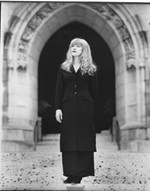Muse for the Ages: Loreena McKennitt
Canadian chanteuse warms to vinyl and Texas
By Margaret Moser, 12:15PM, Wed. Mar. 2, 2016
Just think, had she not shown a proclivity toward world music, we might be lauding advances in animal medicine from Dr. Loreena McKennitt, veterinarian. Instead, Canada’s beloved siren remains celebrated as a muse with an unparalleled triple threat talent for singing, writing, and performing. She appears Friday at a sold-out Paramount Theatre.

An award-winning artist of uncommon vision, the 59-year-old Manitoba native creates her own ethereal sound informed equally by Celtic as Middle Eastern, by classical as by folk, by studio training as much by ear. McKennitt’s panoply of recordings for her own Nineties-born Quinlan Road label are evocative in name alone: A Midwinter Night’s Dream, The Wind That Shakes the Barley, An Ancient Muse. In a perfect circling of life, 2009’s live recording Troubadours on the Rhine has just been released on vinyl.
Throughout our conversation, certain themes emerged from McKennitt, expressed in the thoughtful responses her image engenders. She’s especially desirous that life might slow down a bit, not so much for her but for a generation of children growing up in a technologically alluring age. For her legions of fans, McKennitt’s music as the soundtrack gracing the passage of time eases that hectic pace.
Austin Chronicle: It’s exciting you’re playing so many places in Texas this year, including Austin and San Antonio [where tickets remain for a March 6 show at the Majestic]. I retired from the Chronicle in 2014 and moved an hour down the road to San Antonio, but the music sensibilities of the two cities are night and day. I think about that dynamic in regards to the intimate nature of your touring presently with a trio and promoting a vinyl record.
Loreena McKennitt: People’s appetites have awakened again toward vinyl. The vinyl constituency is a multiple constituency, meaning that people are gravitating to it for different reasons. I think there’s always been an audiophile constituency within my fanbase. And culturally in my fanbase – and I hesitate to use that word, “fanbase” – there are people who desire to engage in life in a slower way, a multiple sensory way. I think vinyl allows for more engagement – the music, art, the liner notes – in a way that’s almost vanished in the last 10, 15 years with digital. So there’s that component.
I would love to have a strategic plan developed and look down the road five or 10 years, but we live in a very dynamic time for the music industry and other professions. We take our cues from a variety of directions, and we saw this reawakening to vinyl as an opportunity, so we’ll be releasing a fair amount of vinyl in the next year or so.
Meanwhile, we hadn’t really toured in the United States since 2007 on the back of An Ancient Muse. A lot of time has gone and we weren’t sure how much interest there was. Had we been forgotten? So, we thought we should go back in a modest way for who’s still around in our audience.
Secondly, though that was one of the pragmatic considerations, I’ve had a number of people over the years say they love the bigger band and the middle eastern music and so on, but they were missing the experience of the more intimate material. I thought we’d start touring for a little while in the trio configuration, and that will allow us to tell more of the stories behind the songs, because when I have the whole band onstage, I’m self conscious about keeping everyone waiting.
AC: Your accompanying musicians in the trio, Caroline Lavelle and Brian Hughes, have been with you a long time, and you seem to have a remarkable relationship with them.
LM: Caroline is a highly accomplished musician, but beyond that, she has other interests that have to do with dog training. She’s as good at that as she is on cello, if not more so. She lives in Devon, England. When you work and travel so intimately with people like her and Brian over the years, you end up being a kind of family whether you aim to be or not. We operate on such a peer level that we’re able to respond to each other’s creative impulses.
At this point, the musicians I work with know my mind. I will give them some instruction or description of what I’m aiming to do and they’ll bring their energies to that. In performance, it’s so much like a dance – when to wait and when to go forward. It’s so gratifying to be with such great people over the years.
AC: I love your notion of performance as a dance.
LM: Yes. It’s many things, and I think a dance is one of them. You’re physically and emotionally moving together, but you have different roles to play at different times. It’s somewhat dictated by the arrangement, but we’ve never written any arrangements down. We play things by ear although all of us are classically trained. And this too I have become fascinated by, how classical music can drum that out of you if you haven’t had a good dose of playing by ear as a child. So it’s a kind of dance.
It’s so pleasurable being on the stage with them, because touring, for me, is such a demanding part of the life.
AC: A lovely book I have titled The Year 1000 suggests that singing is a way of saying, “Please listen.” How do you see the dynamic of singing?
LM: Well, there’s performing for people and there’s singing with people, and they’re very different. If I have to make a preference, it’s singing with people. I like singing for people, but they’re very different things. I think singing with people is an older, more anthropological act, and it represents many things – unity, camaraderie. There’s a kind of tuning of the brain and body.
I sang in the children’s choir from the age of 5, and I think I skirted the bullet of my musical literacy taking over from my ear. Performing for people from someone who never aspired to be a singer [is big a leap]. I always wanted to be a veterinarian and I still say I have the internal disposition of a vet. What got me into music was I loved the sound of music, singing with other people, playing with other people. It had nothing to do with earning money and being well known, or anything like that. So I stayed with it, and once I heard Celtic music, I was infected by it and went on to make a career out of it.
But once I got to the stage where this was what I was doing for a living, I wanted to make sure that what I’m singing about and the underpinnings of my music have something directly related to me, my interests and my passions. On one level that’s Celtic history, but on another level, I’ve used Celtic history in the pursuit of an informal act of self education, because I never went to university.
So singing is a different kind of communion with people. It’s storytelling, sharing something. It’s a bit like a meal: You makes all these dishes and you hope someone likes some of them. Maybe their curiosity will be peaked to learn something or it might soothe them in some way, I don’t know. For me, I feel it’s not suitable to project what someone should get from my music.
AC: Just put it out there?
LM: Yes. And in the act of singing, I think of the Sufi concept of polishing the mirror of your soul. With some of the more emotional or internal songs, we’re all very much the same. We have universal and timeless experiences. Some people are not as well equipped to express their own feelings and what I’m witnessing is people tap into some of what I do as they do with other artists and singers. They identify.
AC: You spoke of early musical education and singing in a children’s choir. When you were a teenager, were you into pop music? Did you listen to the radio and buy 45s?
LM: Interesting you ask that, because this too has been a strong point as I reflect back as my own musical development, and now, about whether or not children are getting engaged with music. I’ve been amateur polling more accomplished musicians about how they got into music. Was it your parents, grandparents? What I’m seeing is that while it’s wonderful to have your parents or grandparents involved like on the west coast of Ireland or Welsh villages, it doesn’t seem to be the only way. The other, stronger way seems to be that children listen to music when it suited them and they have the technology.
In my day, once I heard folk music, I was less into the Beatles or Elvis Presley, but much more into Peter, Paul & Mary, Simon & Garfunkel, Gordon Lightfoot, Leonard Cohen. I’d save my money and when I had the opportunity to buy a recording, I’d take it back home and play it when I wanted on the turntable. That ability to gratify yourself through music as an easy, quick exercise is very important, and might be as important in a different way than hanging around on Sunday night like in the Maritimes, when you’ve got extended family and fiddles and bodhrans and stuff.
AC: Lately, I’ve been obsessed with the song “Barbara Allen,” and the phrase “the briar and the rose,” and the enduring theme of that image. I’ve loved the song since I was 13, but it just now has new meaning to me. With so many of songs on the new vinyl being a familiar part of your repertoire or maybe having to re-arrange them for a trio, do they reveal themselves anew to you?
LM: Enduring themes are universal and timeless. As we move along life’s conveyor belt, we add more experiences to our lives. Some are good, bad, difficult, etcetera, but I think with all our life experiences, it continues to change us as we evolve, so it’s possible we relate to the same document in a different way because new experience has changed the lens of how we see it.
“Stolen Child,” is one that’s changed drastically for my interpretation of it, because I’m coming to a personal view that childhood is really being stolen from children and family life is less and less valued through premature use of connection technologies. Even a song like “The Old Ways,” which I wrote in ’91 or ’92, already on the west coast of Ireland I was witnessing the old ways disappearing. There are things changing and then there’s things just disappearing.
AC: The language, for one thing.
LM: Yes, but also a social way of being, where people are much more rushed, trying to cram more and more. Human relationships need time sharing, and yet at a time of great technology and affluence we have more choice than we’ve probably ever had before. The question is, how well are we making these choices? Particularly when it comes to our families and child development.
AC: As I was getting ready to do this interview, it struck me that I was performing a ritual of knowing I would have to sit and talk on the phone. I get a glass of water, Kleenex, glasses, a comfortable place to sit – few distractions as possible. When you do interviews, do you have a ritual to prepare for repetitive questions?
LM: [Laughs] I so enjoy these. I learn where other folks are at, like when you talked at the beginning about the difference between Austin and San Antonio music sensibilities. I thought, “Oh wow – I want to learn a little more about that!” But I haven’t engaged in the music industry in the way some other artists do, so for an interview like this, I’d just make sure to have a glass of water. Because it’s just a pleasure to speak with people.
A note to readers: Bold and uncensored, The Austin Chronicle has been Austin’s independent news source for over 40 years, expressing the community’s political and environmental concerns and supporting its active cultural scene. Now more than ever, we need your support to continue supplying Austin with independent, free press. If real news is important to you, please consider making a donation of $5, $10 or whatever you can afford, to help keep our journalism on stands.
Loreena McKennitt, Quinlan Road, Troubadours on the Rhine, An Ancient Muse, Caroline Lavelle, Brian Hughes, Beatles, Peter, Paul & Mary, Simon & Garfunkel, Gordon Lightfoot, Leonard Cohen, Elvis Presley










